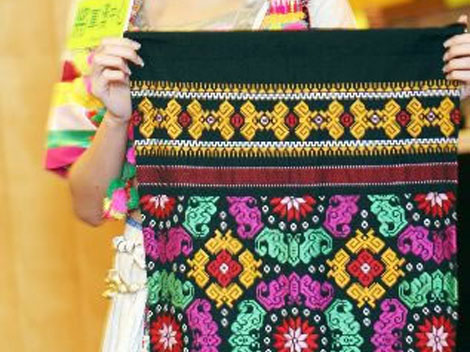
Zhuang brocade has a long history. Way back in the Han Dynasty, ancient Zhuang ethnic people wove what was known as "banbu" or "streaky cloth", the predecessor of brocade. After the founding of the People's Republic of China, archeologists discovered several remnant pieces of orange-color brocade with labyrinth patterns in Pit No.7 of a Han-Dynasty tomb in Luobo Bay of Guangxi. This finding proved the existence of the brocade weaving technique in Guangxi in the Han Dynasty.
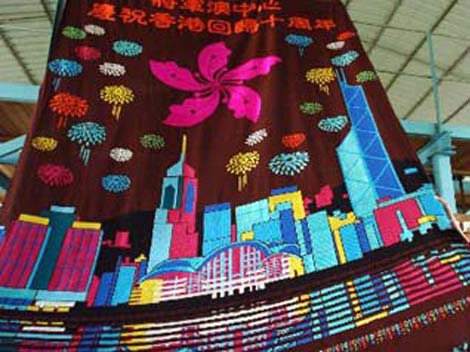
The Zhuang brocade weaving technique originated in the Tang and Song Dynasties and enjoyed further development in the Ming and Qing Dynasties. Zhuang brocade was included in the tributes to the imperial court in the Ming Dynasty. At the end of the Qing Dynasty and the beginning of the Republic of China, Zhuang brocade suffered decline. With a development history of 1,000 years or so, Zhuang brocade stands out for its durability, exquisiteness, creative design and intricate patterns. It comes in more than 20 items in three unique categories with over 50 patterns.
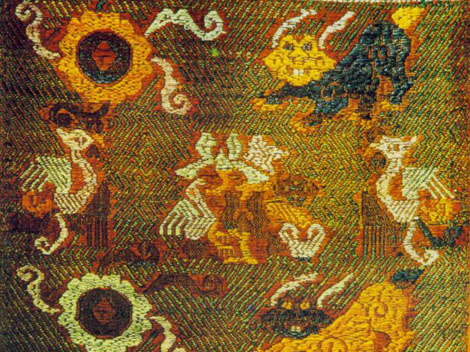
It is said that there was a Song-Dynasty legend about Zhuang brocade. According to the legend, there was a Zhuang ethnic woman called Sister Dani, who became an expert cloth weaver. Unlike other cloth weavers, she was keen on continuous innovation. Once, in order to create a new pattern, she sat at the doorway, racking her brains while watching a big spider web under the eaves. From moon rise to moon fall and to sunrise of the following morning, she still had no clues at all.
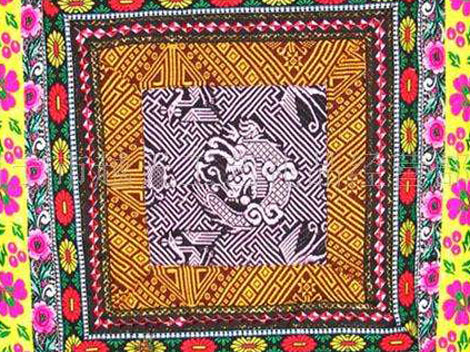
Just as she was about to leave, she suddenly saw the morning sunshine on the spider web full of dewdrops. The whole web was shining with a palette of colors. It looked extremely beautiful. A wonderful ideal struck Sister Dani, who instantly ran to the central room and moved the loom out, putting it right under the eaves. Watching the beautiful patterns and colors of the spider web, she began to weave with multicolor silk threads.
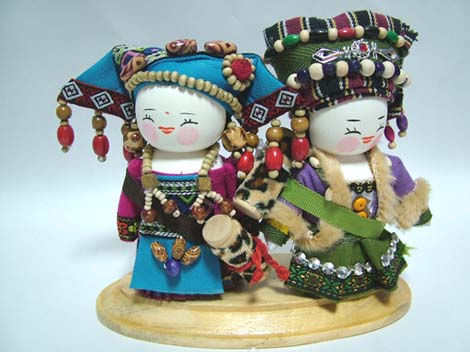
With her deft hands flying up and down without a stop, she managed to weave a piece of brocade within just half a day. After learning Sister Dani's success, the Zhuang weaving girls from various areas all came to learn from her. Thus the Zhuang brocade weaving technique was spread in places with the Zhuang population.
There are two major techniques of weaving Zhuang brocade: 1) using ordinary looms; 2) using "pig cage"loom. Zhuang brocade woven with a "pig cage" loom is pretty much three dimensional, with a variety of patterns. The color matching of Zhuang brocade is generally perfect. There's sharp contrast between a riot of color, and beauty of simplicity as well. The brocade is luxurious but not vulgar, simple but not in poor taste. Cases in point: works entitled "Phoenixes Flying in Pairs" and "Two Phoenixes Playing with Chrysanthemum Flowers". These works fully demonstrated the Zhuang women's extraordinary wisdom and excellent aesthetic taste.




